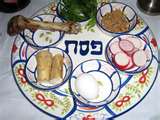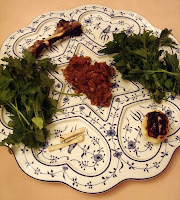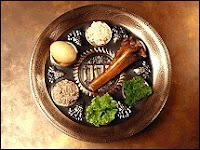Here Comes Moishe Matzoh Ball…
(Song Credit (and there are more verses) to Dr. Melvin Borden, family physician extraordinaire, and an even more extraordinary father, father-in-law, and the original Pop-Pop)
It’s coming down to the wire. Next Monday, April 18, at 6 pm, we will be sitting down for the first Seder of Passover. As I write this, I am expecting 31 people to be around the table. To get to that moment has taken weeks of planning, prepping, organizing, shopping, and of course, because hey it’s me talking – worrying. And yet, I wouldn’t change a thing. I love a full table, brimming with favorite foods for each of our guests; old china and prayer books from relatives no longer with us, but always there in spirit; family and friends reconnecting to tell the story of the exodus of the Jews from Egypt – and how the lessons learned from that time still have relevance today.
Our seders are loud and lively. While we definitely read parts in Hebrew, most of it is in English, with commentary both wise and wiseass encouraged. This year there will be four children – and oh how much sweeter it makes it. There’s Ray, my sister’s oldest grandson, now 7 and able to read in English one of the prayers. There’s Hal, my sister’s younger grandson, aged 2, and a full participant in the search for the Afikoman – a hidden piece of matzoh that the children find and redeem for prizes. There’s Vivian, 18 months, the daughter of Larry, my son’s oldest friend. We met Larry when he was just a few months older than his daughter – how wonderful that the new generation becomes friends too. And then there’s my beautiful granddaughter Riley, 10 months old, no teeth but able to gum almost all foods, full of smiles that make you melt, and a whole new perspective on the Jewish phrase, L’dor Va Dor, from generation to generation. At these seders, we pass our faith, our customs, our love from one generation to the next.
The menu varies only slightly each year. Gefilte Fish with horseradish, potatoes and eggs in salt water, matzoh ball soup, a chicken dish, brisket, and salmon, salad, sweet potato casserole, and asparagus. Desserts include fruit and lots of store-bought goodies.
I would love to capture in a bottle the memories of all those seders so that I could take a whiff of the happiness of those nights during the rest of the year when times are more difficult. It’s lots of hard work but the payoff is immeasurable.
I wish for each of you a Zissen Pesach – a sweet Passover.
Marian, aka the Northern half of Evelyn David
http://www.evelyndavid.com/
Brianna Sullivan Mysteries – e-book series
I Try Not to Drive Past Cemeteries- Kindle – Nook – Smashwords
The Dog Days of Summer in Lottawatah- Kindle – Nook – Smashwords
The Holiday Spirit(s) of Lottawatah- Kindle – Nook – Smashwords
Undying Love in Lottawatah- Kindle – Nook – Smashwords
A Haunting in Lottawatah – Kindle – Nook – Smashwords
The Sullivan Investigation Series
Murder Drops the Ball (Spring 2011)
Murder Takes the Cake- Paperback – Kindle
Murder Off the Books- Paperback – Kindle
Riley Come Home (short story)- Kindle – Nook – Smashwords
Romances
Love Lessons – Kindle – Nook – Smashwords



